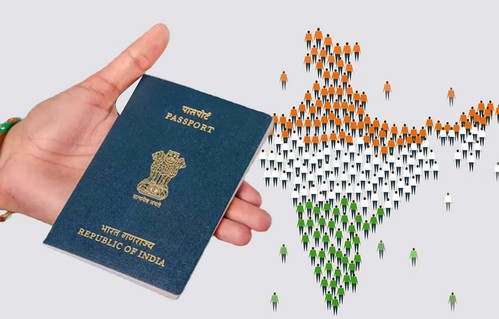Introduction
Immigration is the movement of people from one country to another with the goal of settling there permanently. Getting citizenship in the country, they have relocated to, and using their fundamental rights, are the largest obstacles that immigrants face. India undoubtedly continues to be a desirable location for international investment. Among the top 10 foreign investors in India are the United States and the United Kingdom, whose nationals are increasingly visiting the country for business.
Countless joint ventures include the movement of labour, equipment, and technology thanks to the recent tremendous deregulation of the Indian economy.
Immigration-specific laws and policies that specify the requirements and restrictions for attaining citizenship typically address these challenges.
A person of Indian heritage or a family member of an Indian ancestor is defined as a citizen in Articles 5 to 11 of Part II of the Indian Constitution. Article 10 addresses a foreign national’s right to citizenship in India, subject to any additional legislation passed by the legislature. The Indian constitution forbids the holding of more than one citizenship and only recognises a single citizenship per person.
Additionally, it specifies that a foreign national can obtain Indian citizenship by registering as a foreigner with the Foreigners Registration Officer (FRO) or Foreigners Regional Registration Officer (FRRO) and going through the naturalisation process (after residing in India for at least 14 years). Unlike jus soli, which is citizenship by birth, Indian law recognises citizenship by blood or jus sanguinis.
Legislation and policy
The Foreigners Act 1946 (also known as the 1946 Act) is the main piece of law pertaining to foreigners in India. It also establishes the necessary guidelines for the registration of foreigners. Strict regulations for the entry, movement, and eventual exit of foreign nationals from India are also outlined in the 1946 Act. The 1946 Act’s Section 3 outlines the goals of this legislation.
In addition, pertinent processes for the registration of foreign visitors to India are outlined under Section 6 of the previous Registration of Foreigners Rules 1939 (the 1939 Rules). A foreigner entering India on a valid visa for a period longer than 180 days is required by Rule 6(1)(b) to present the registration report at the port or other location of arrival, as stated by the registration officer.
This registration report must be submitted within 14 days of the foreigner’s entry in India, according to Rule 6(2)(b) of the 1939 Rules. According to Rule 6(3), each foreign national is required to submit the registration officer with a registration report as well as any pertinent information in their possession to reassure them of the veracity of the information they have provided. After signing the registration report, the foreign national is eligible to get a certificate of registration from the responsible authority.
However, citizens of Pakistan must register within 24 hours of their arrival.
According to Rule 15 of the 1939 Rules, returning foreign visitors must also turn in their certificate of registration before leaving. Foreign visitors who violate any of the instructions included in their certificate of registration will be subject to fines outlined in Section 14 of the 1946 Act.
Immigration authorities
The relevant Indian foreign embassy or consulate abroad has the last say over whether to grant a visa to a foreign worker or business visitor. As will also be covered below, no application for judicial review can be successfully filed in opposition to the denial of an employment visa (E visa) to a foreign individual. As soon as the long-term employee arrives in India, it becomes very important to report compliance to the Foreigners Regional Registration Office (FRRO). Under the Registration of Foreigners Rules 1939, the designated powers of the FRRO are often exercised by the Senior Superintendent of Police or the local district magistrate.
Under Section 6 of the Registration of Foreigners Rule 1939, the registration certificate must be received within 14 days of the foreign employee’s arrival in India if their stay exceeds 180 days. This is similar to a permit to dwell.
Foreign nationals who stay in India for longer than 180 days are subject to severe penalties for failing to register with the FRRO. These penalties can include fines, jail, or both.
Section 10 of the Foreigners Order of 1948 contains the prohibitions on hiring foreign nationals.
Conclusion
Corporate immigration issues are obviously not a priority in the current environment, where international trade and trade relations are on the rise in the post-COVID regime. The government of India is heavily emphasising increasing commerce and revenue generated from the international market.
The strict laws and court rulings governing the entry, presence, and movement of foreigners in India, including business visits, continue to prioritise protecting the interests of national security. The Reserve Bank of India simultaneously keeps a careful eye on all financial transfers, both in and out of India, made by foreign employees living abroad as well as the cross-border business dealings of international companies doing business in India.
There is still an unequivocal argument in favour of framing a new set of consolidated rules focusing exclusively on business immigration into India, which should replace the existing outdated and rigid provisions.
Adv. Vartika Chahal


I’m always informed about potential medication interactions.
where can i buy lisinopril pill
I appreciate the range of payment options they offer.
Their commitment to global excellence is unwavering.
xylitol in gabapentin
Top-notch medications sourced globally.
Danach kannst du den Bonus und die Freispiele direkt selbst in deinem Profil aktivieren. Neue Spieler
können mit starken Willkommensboni für Casino und Sportwetten starten. Spinrollz
bietet dir eine breite Palette an Aktionen und Belohnungen.
Dieses Casino begeistert seine Spieler mit regelmäßigen Kampagnen und
kreativen Angeboten, die weit über einen klassischen Willkommensbonus
hinausgehen. Ein spezieller Fokus liegt auf verantwortungsbewusstem Spielen, da das Casino überzeugt ist, dass Glücksspiele süchtig machen können. Dieses Online-Casino bietet darüber hinaus ein durchdachtes VIP-Programm mit Cashback und exklusiven Boni für treue Spieler.
References:
https://online-spielhallen.de/verde-casino-bonus-ohne-einzahlung-25e-gratis-sichern/